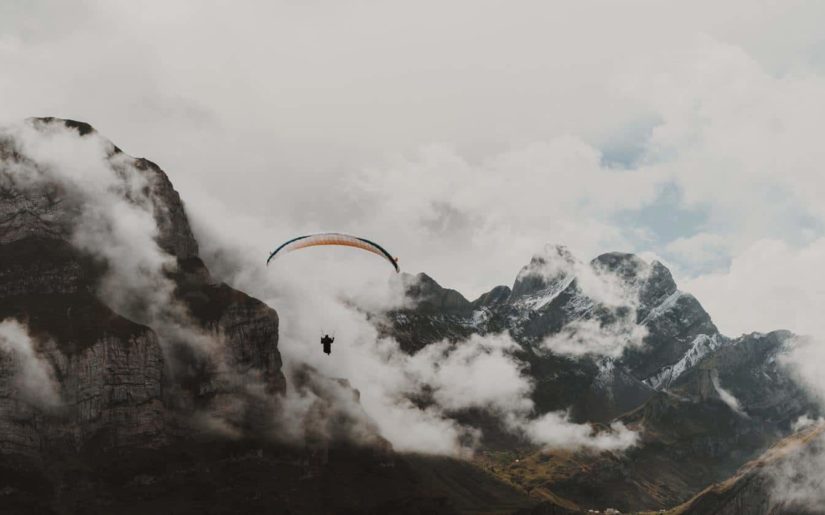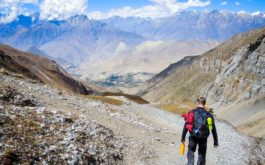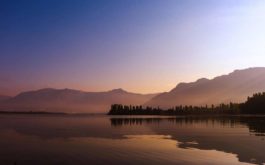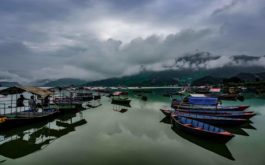“I just want to fly man, it’s all I think about. All I want to do is fly.”
– Ajit “Jimmy” Gurung, age 21
I have been waiting for weeks to go paragliding.
You may remember my first attempts at making this flight happen. I tried to go to the bank and ended up accidentally buying a goat.
Since then, it has been a week or two without progress; we are settling in to Nepal and I am getting closer to mastering the bus system. Okay, that is a lie. I am not getting any closer at all to mastering it. But I am, at least, no longer coming home with random livestock.
But still, I have been waiting for weeks to go paragliding.
“He is innocent, man!”
Ajit Gurung. My pilot and traveling buddy. My guide to the ethnicities and the eccentricities peculiar to Pokhara. Ajit has been waiting to fly his whole life. Twenty-four long years. Currently we are grounded because he had a minor motorbike accident. I am so accustomed to motorbikes in South Asia and the surrounding regions that this doesn’t even register with me. I don’t think:
“should I be flying with a kid who can’t even drive a moto without getting hurt?”
Nepal is a wonderland, but it is an arbitrary and capricious wonderland. So, it has conspired against us to keep us earthbound. Our reasons for this are vast and innumerable.
We are grounded by weather. It is monsoon season, after all. We are grounded because I missed the bus. We are grounded because my kid is grouchy and because I have to sell my goat. Also because Ajit needs to go visit his brother in prison.
“He is innocent, man. That guy died of an overdose. My brother was just the last one to see him, so the government threw him in prison. They are always trying to keep us Gurung down.”
The Gurung
Since we can’t go paragliding, talk turns to heritage, and clan, and family. Although I am quoting him as such, Ajit’s last name is not Gurung. The Gurung are his tribe, his people, his ethnic group. Gurung is one of the 59 indigenous nationalities in Nepal residing on the foothills of Annapurna, Machhapuchre mountain range. The name Gurung is derived from the Tibetan word ‘Grong’ which means farmers. Gurung call themselves ‘Tamu’ which means horseman in the Tibetan language.
The Gurung I know are not horsemen. These boys ride in harnesses, not saddles, and they are pulled by the forces of wind and gravity, not by horsepower. For centuries, the main occupations of the Gurung have been the training of boy soldiers. They have achieved fame by joining British army during the colonial years and the turbulent post-colonial era, becoming renowned as soldiers.
Death is of central symbolic importance for Gurungs. It does not surprise me; their lives are conducted on the sides of mountains, around perilous switchbacks in the trails, which are more dangerous (although less exhausting) going down than coming up. This is true for a lot of hikes at altitude; if you are going to die on Everest or K2, you are most likely to die coming down.
This is true for glider pilots as well, although, I am told, “we don’t die.”
Gurung as Soldiers
Gurungs are soldiers, too, and that is what soldiers are paid to do, to die. To die and to cause others to die. Because they are incredibly loyal and passionate and tough, they make great grunts, especially in mountainous areas and at altitude, places where other soldiers struggle. Among other places, they fought for the Shah Gorkha Kingdom and played a great role in unifying Nepal. After that they served for the British, India, Burma, Singapore and Hong Kong as Gurkhas. So it is no wonder that the central aspect of their social society is the ceremony celebrating death.
A GurUng Funeral
A funeral is a multi-day affair, as befitting a life well lived, a life of daring and heights, of making war and peace, of raising sheep and Gurung babies. The ritual is called “pae” and involves two nights and three days of ritual activity. Naturally, it is attended by kin, villagers, and, hopefully, a large number of people who come for “the conviviality and spectacle.”
Oh, I like spectacle.
When I go (hopefully not soon, in a glider crash) make sure there is plenty of spectacle at my funeral. I want noise, I want color, I want wailing and laughter, I want Gurung and Gurkhas and traditional costumes and martial knives and I want pots of bubbling lentils the color of an autumn moon.
I want to fly.
Buddhist lamas and the panju and klihbri priests of the pre-Buddhist religion may officiate at the pae. Sure! Bring them along to mine, too. Death is believed to involve the dissolution of elements that make up the body, so that the earth element returns to earth, fire to fire, water to water and air to air. Our lives lately are far too much earth, just enough lake water, and not nearly enough goddamn air.
We are grounded because Ajit’s wing is broken. His wing is the glider, the parachute, the magnificent flying machine. It is a ‘helluva’ invention.
The idea goes back to the dawn of humanity, I am sure. There are no new ideas under the sun or flying just above the earth.
The prediction of gliding
In 1954, an aerospace engineer named Walter Neumark predicted (in an article in Flight magazine; magazines were the blogs of their day, kids) a time when a glider pilot would be “able to launch himself by running over the edge of a cliff or down a slope … whether on a rock-climbing holiday in the Isle of Skye or skiing in the Alps.” (Found this in: Walter Neumark, “The Future of Soaring”, Flight magazine, 14 May 1954)
There are cool nuggets of the space race era scattered all about the history of paragliding. Initial attempts at developing the “sail wing” were for recovery of NASA space capsules, which is badass on a Chuck Yeager, Tom Wolfe, the Right Stuff sort of level.
Aside from here in Pokhara, Europe is the epicenter of paragliding. France alone currently has an astonishing 25,000 active pilots. I can testify to that. A lot of them do their ground training and tandem learning flights at the schools here. They walk around town looking like GQ models in their leather pants, their hair perfectly tossed by the mountain breezes, and their accents making every woman in town swoon. It’s SUPER annoying…
As with all aircraft, launching and landing are done into wind. My whole life feels like it is being lived into the wind; unseen forces are constantly pushing against me and making my progress harder. This is why I want to fly; to make the wind work for me for once, to shed the burden it places upon me and take off.
Why we’re grounded
We are grounded because Ajit’s mom needs money to buy daal bhat, which is stewed lentils and cumin over rice and is the only thing that powers us other than our silly aspirations. We don’t fly because his brother needs something for school, because Ajit needs his braces tightened.
God bless his mother’s commitment to dental care; despite being desperately poor, my man has some quality orthodontia. He also has quality flattery and has charmed my wife to her adorable, generous core. The lovelorn, grounded young pilot keeps telling us he wants to be our son in law. He can’t quite decide between this designation and being my “kid brother.” I am more than twice his age; I mention this to my father and he says that he is flattered at the notion he could have been fertile that late in life. A virile tribe, my people.
We are grounded because this is Nepal and every day a dozen possible factors come together to keep young men from working. Some are malignant, like traffic jams, some are benign, like when grandma is lonely and needs a handsome grandchild to talk with. A little tea and a lot of conversation go a long way to whiling away the hours.
“Yeah, man, a lot of my friends have joined the army. Gurung are Gurkha, too.” Waiting for the rain to stop and the clouds to lift, I compose titles for this piece. “Gurkhas Grounded in Pokhara.” We are grounded because I am trying to save enough money to pay for the flight. We are grounded because I am trying to earn enough money to buy the house; this is the reason I am flying in the first place. Life is a vicious circle.
In the skies above…
The other pilots do circles in the sky above us. Pokhara seems to be a hive of acrobat activity lately and the paraglider pilots are a big part of the reason why. These boys aren’t content to soar for hours, powered by nothing but thermal air currents and a feeling of invincibility left over from their teenage years. No, they need to fly.
Fly in grand semi-circular arcs, like skiers coming down a slope in four dimensions. Fly in loop-de-loops, in somersaults and poses, like the daring-est of devils. They fly so close to the stall speed that you know that cheating death is part of the appeal.
Maybe more than just a part. Maybe a majority. Or maybe it’s the whole megillah.
We stare at them, jealous. We are eating spicy chicken and cold wheat noodles at a little restaurant on the footpath around the lake. The food is delicious and cheap, so we eat piles of it and ruin my weekly budget. There may not be any more pasta, but we will have money to fly.
Some day.
We dream of flying in the way my son dreams about marshmallow crème filling, the way Robyn Hitchcock dreams of trains, the way a convict dreams of freedom. We dream of flying in the way my forty-year-old wife dreams of another baby. Dream of flying in the way Gurkhas dream of combat; to prove our manhood and our daring and our worth. To show off for our women since work sucks and is boring and isn’t available anyway.
Work. Pfff. Fly.
Work. Pfft. What is there for work in a country as poor as Nepal? You want to spend every day cleaning hotel rooms? You want to spend every day driving a cab in deadly traffic? No.
You want to fly. You could even get a job as a glider pilot for one of the big tourist companies, the ones that take two dozen Japanese and Korean alpinists, real thrill seekers, up Mt. Sagarmartha every day. Those pilots earn eighty dollars every day for flying! Just for flying in the morning with a person strapped to their lap. Sometimes that person is even a pretty woman!
We dream of flying in the way a prisoner dreams of a woman’s touch, any woman’s. The hug of a concerned mother, the slap of a spiteful girlfriend.
We dream of flying because flying means freedom. The wind blows the scales from our eyes and lets us see the world with clarity and precision and a little bit of glossy sheen to make it look more beautiful than it already is, to take away the dark shadows, the frame ups and the bunko jobs.
Ajit aspires to greatness in the air. Me? I just want to tag along. The verb aspire comes from the Latin word aspirare, which means “to breathe upon.”
Now finally it makes sense; like the moment of liftoff, I am held by an inexplicable grace; language as it sometimes does for writers, has given all of this clarity and meaning. The truth was in the word, in the verb.
I know now why we will fly (and, oh, we will), to aspire: to feel the soft, propulsive, and protective breath whatever blessed being animates the earth and the air around it.








